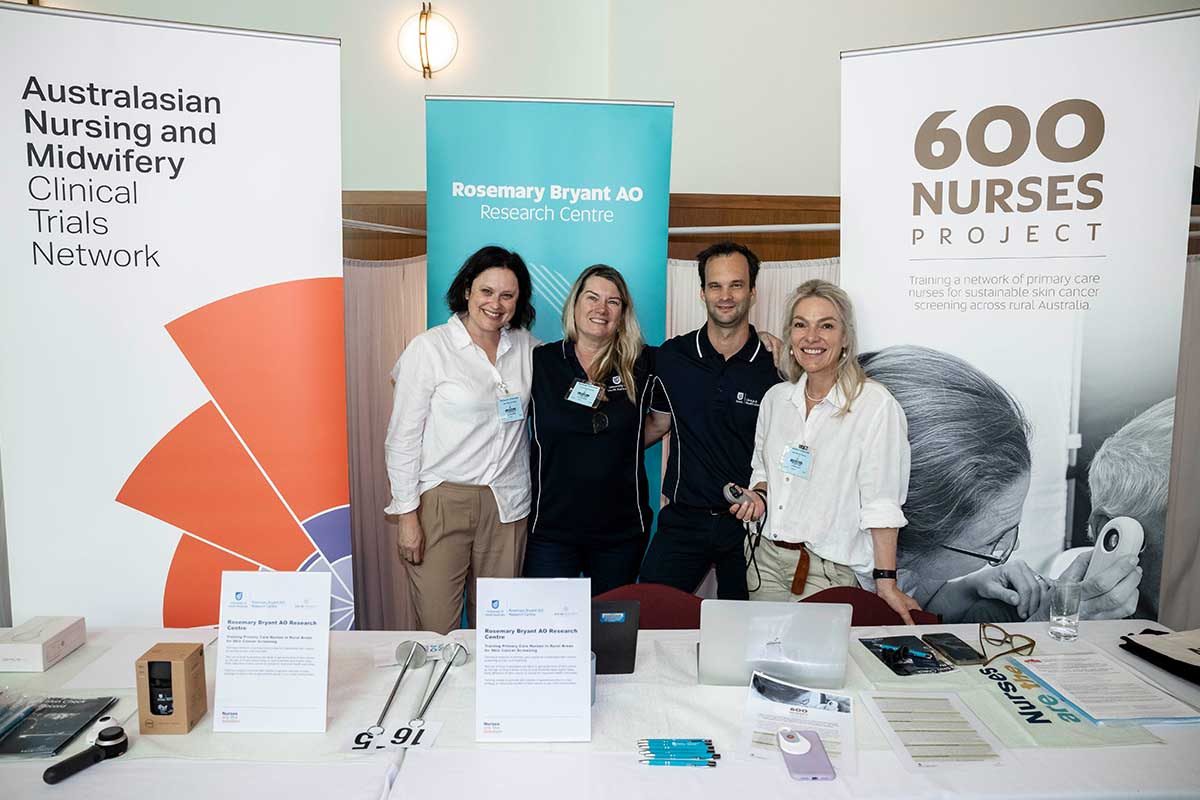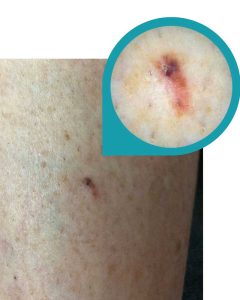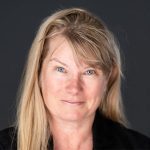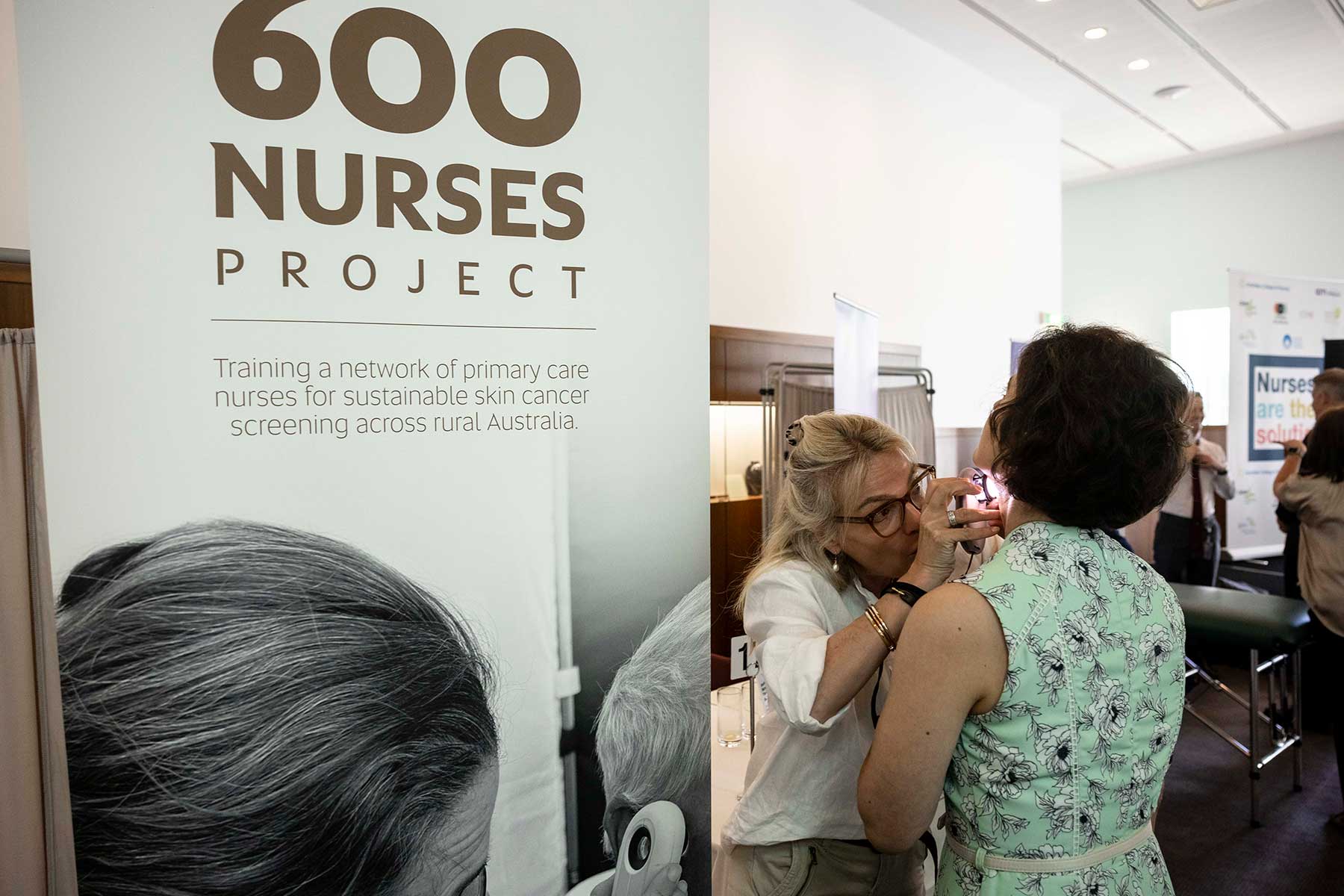Australia is renowned as the ‘sunburnt country’, but this title comes with a dark side: we have the highest melanoma rates in the world. Sadly, melanoma claims the lives of approximately 1,400 Australians every year (Melanoma Institute Australia [MIA], 2022). What makes this even more tragic is that melanoma and other skin cancers are among the most preventable, detectable, and treatable forms of cancer.
The 600 Nurses Project is a transformative initiative in the prevention and detection of skin cancer in rural Australia. By training primary care nurses to lead targeted skin checks, we are not only bridging the healthcare gap for underserved communities but also saving lives through early detection. This innovative model of care empowers primary care nurses to work to their full scope of practice, leveraging technology and multidisciplinary collaboration to create a future where preventable deaths from skin cancer are dramatically reduced.
Key facts about skin cancer
- Australia has the highest rate of skin cancer in the world.
- Melanoma is the 3rd most diagnosed cancer in Australia, and the most common cancer in those aged 15-29 years.
- 2 out of 3 people will receive a skin cancer diagnosis by the age of 70 years.
- Melanoma incidence is highest among men, people aged 70-79 years, or those living in regional areas of Australia.
- Without intervention, it is projected that by 2030, an additional 14,000 Australians will die from melanoma, and over 205,000 will be diagnosed.
- Skin cancer is the most expensive cancer to treat nationally.
- The economic cost of melanoma to the nation is estimated to reach $8.7 billion by 2030 if current trends continue.
(Cancer Council, 2023; MIA, 2022)
Key national priorities
- Develop and implement a national strategy for melanoma prevention and awareness.
- Invest in Australia’s high-impact melanoma research.
- Improve early detection and evidence for a National Targeted Screening Program.
- Reduce variation in diagnosis and treatment.
- Develop a melanoma supportive care and survivorship model.
(MIA, 2022)
A nurse-led solution
Service gaps exist in the provision of skin checks for people living in rural Australia who are at high risk of skin cancer. There is a shortage of professionals trained in skin checks in regional and rural Australia which impacts waiting times and out-of-pocket expenses for patients (MIA, 2022). Access to opportunistic screening needs to be provided to improve care for these populations (Adelson & Eckert, 2020). These challenges highlight an urgent need for primary care nurse training, enhanced clinical practices, and innovative care models to revolutionise early melanoma detection and deliver more effective and efficient skin cancer surveillance for Australian communities. Nurses, the largest distributed healthcare professionals in regional areas, are well positioned to work collaboratively with general practitioners (GPs) and dermatologists to provide skin checks. Multidisciplinary team (MDT) care in skin cancer is recognised as best practice and reflected in the optimal care pathways for melanoma and non-melanoma skin cancers (Cancer Council, 2021). Nurses are key MDT members and recognised primary care providers in rural communities, having a broad scope of practice and working collaboratively in extended and advanced roles. Nurses can, therefore, lead models of care for skin cancer prevention through to early detection and management (Beames et al., 2023).
There are approximately 2.5 million people over the age of 50 years living in regional Australia. For each person to receive an annual skin check, we have calculated that 600 full-time equivalent primary care nurses will need to be trained. This is where the 600 Nurses Project was founded, a collaboration between the Rosemary Bryant AO Research Centre (RBRC) at the University of South Australia (UniSA), and Skin Smart Australia. The initiative is focused on training primary care nurses to perform targeted skin checks in regional communities to reduce the number of lives lost each year from skin cancer. Empowering nurses to lead screening initiatives is a game-changer, enabling early detection and management of skin cancer, particularly in underserved and high-risk communities.
Primary care nurses undertake a comprehensive online training program that equips them with the knowledge and skills required to perform skin checks using dermoscopy. We then provide a free ‘pop-up’ skin check clinic at a community event in a regional area and these nurses get hands-on experience performing skin checks under the guidance of an expert dermoscopist. Any lesions suspicious for malignancy are imaged and uploaded to artificial intelligence (AI) software to support provisional diagnoses, clinical decision making and optimise multidisciplinary collaboration. People with any suspicious lesions are referred for medical follow-up.
Our impact
Facilitated by our funders, Preventive Health SA, and previously The Hospital Research Foundation and Skin Check Champions, we have provided eight free pop-up skin check clinics in regional communities of South Australia, trained 36 regional nurses, screened 860 people, detected 78 lesions suspicious for melanoma, and 239 for non-melanoma skin cancer. Over half of the people who engage with the service have never had a skin check prior, and 10-15 per cent are classified above average risk for melanoma. Consumers overwhelmingly accept the service and GPs have been supportive of this nurse-led model.
Our goals
- Educate and train primary care nurses to provide ongoing, sustainable skin cancer detection and care in regional areas.
- Empower primary care nurses to lead targeted skin checks.
- Drive early detection of skin cancer to reduce preventable deaths.
- Increase access to skin cancer screening in underserved, high-risk communities.
- Enhance health outcomes by improving timely intervention and care.
- Provide a long-term, cost-effective solution to bridge the healthcare gap in rural Australia.
- Provide best-practice research evidence to inform a National Targeted Screening Program that optimises the role of the primary care nurse and where possible, telehealth and AI.
- Obtain funding to provide ongoing support for the 600 Nurses Project. The RBRC will be making a submission for the 2025-26 Federal Budget.
Parliamentary Friends of Nursing
The 600 Nurses Project provided a nurse-led ‘pop-up’ clinic at the Parliamentary Friends of Nursing event at Parliament House in Canberra on 19 November 2024. Four lesions suspicious for malignancy were detected by a registered nurse (RN) who recently trained in performing skin checks. The team showcased how primary care nurses are the solution to increasing early detection of skin cancer in high-risk communities.

Image: 600 Nurses Project at Parliamentary Friends of Nursing
Case study
Jo Lloyd, Chief of Staff for the Office of Dr Gordon Reid MP, took the opportunity to have a mole on her leg checked by an RN at the Parliamentary Friends of Nursing event. During her spot check with the RN, the lesion was noted to have several suspicious features including more than one colour and asymmetry in shape. We recommended that Jo seek medical follow-up. Jo required two surgeries to completely remove the lesion, which was later diagnosed as a basal cell carcinoma (BCC) (pictured).
“I cannot thank the team enough from UniSA. I recently met them whilst at work in Parliament House and participated in a skin check. I had noticed a new spot that I was keen for them to review. Thankfully, I did. They did suggest that I seek a follow-up with a skin specialist which I did, and I had the spot removed. I would like to note that I had attended another skin clinic previously about this spot where no concerns were raised. The nurses were incredibly professional and thorough in their examination. They have followed up with me to ensure I had the spot reviewed and again following the removal. I thank them for their diligence. This service highlights the importance of having our health practitioners working to the top of their scope of practice.” — Jo Lloyd

Conclusion
People living in rural and regional Australia face a disproportionate risk of skin cancer, compounded by barriers to essential skin checks that could save their lives. Primary care nurses are the key to solving this crisis. By training primary care nurses to perform skin checks, we can close the healthcare gap and ensure early, life-saving detection. Empowering nurses to lead these efforts in their communities will not only drive more timely and effective interventions but will also improve health outcomes and reduce the national burden of skin cancer. Investing in this initiative is not just a commitment to the health of rural Australians – it is an investment in the future strength and sustainability of our entire healthcare system.
If you would like to find out more about the project, please contact RBRC@unisa.edu.au.
This article was originally published in the Autumn 2025 edition of ACN’s quarterly member publication The Hive. Members can access all past editions of The Hive on MyACN. Non-members can get a sneak peek by viewing our open-access articles.
Author: Professor Marion Eckert MACN
Professor of Cancer Nursing
Director, Rosemary Bryant AO Research Centre
University of South Australia

References
Adelson, P., & Eckert, M. (2020). Skin cancer in regional, rural and remote Australia; opportunities for service improvement through technological advances and interdisciplinary care. Australian Journal of Advanced Nursing, 37(2), 25-30.
Beames, C., Adelson, P., Sharplin, G., & Eckert, M. (2023). Primary care nurse’s role and educational preparedness in skin cancer screening and early detection: A scoping review. Journal of Advanced Nursing. 80(6),2228-2251.
Cancer Council. (2021). Optimal care pathway for people with melanoma. Second Edition. Australian Government. https://www.cancer.org.au/assets/pdf/melanomaoptimal-cancercare-pathway.
Cancer Council. (2023). Skin cancer incidence and mortality. https://www.cancer.org.au/about-us/policy-and-advocacy/prevention/uv-radiation/relatedresources/skin-cancer-incidence-and-mortality
Melanoma Institute Australia. (2022). State of the Nation. A report into Melanoma – A National Health Priority. Insight Economics. https://melanoma.org.au/wpcontent/uploads/2022/03/MIA-and-MPA_SoN-Report_Final-Report_28-March-2022.pdf.





